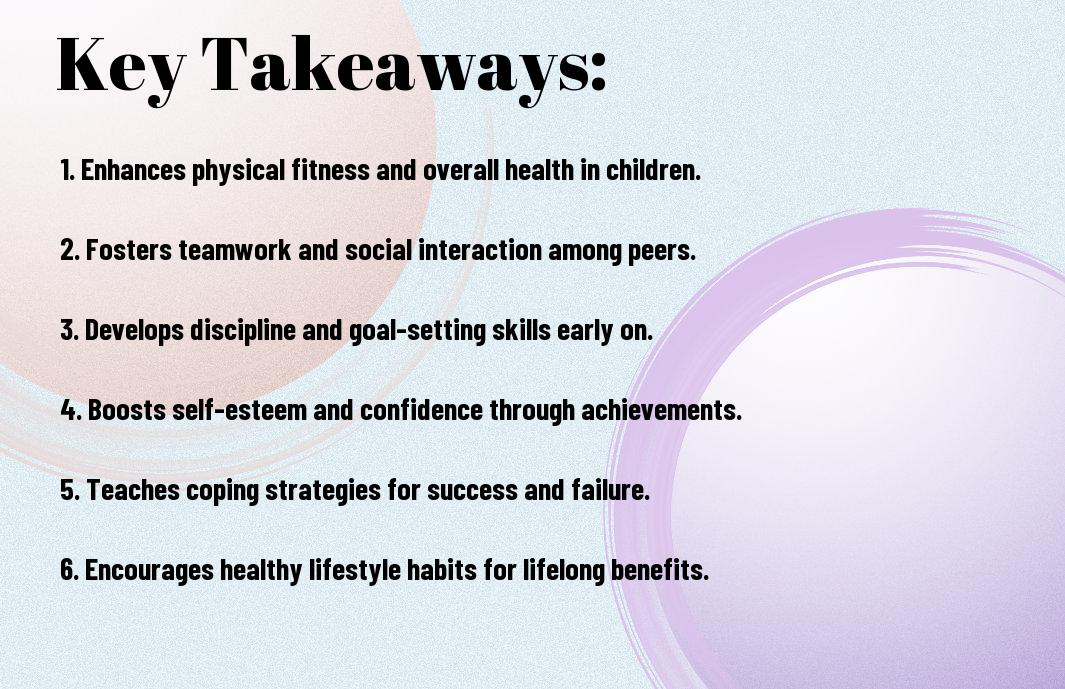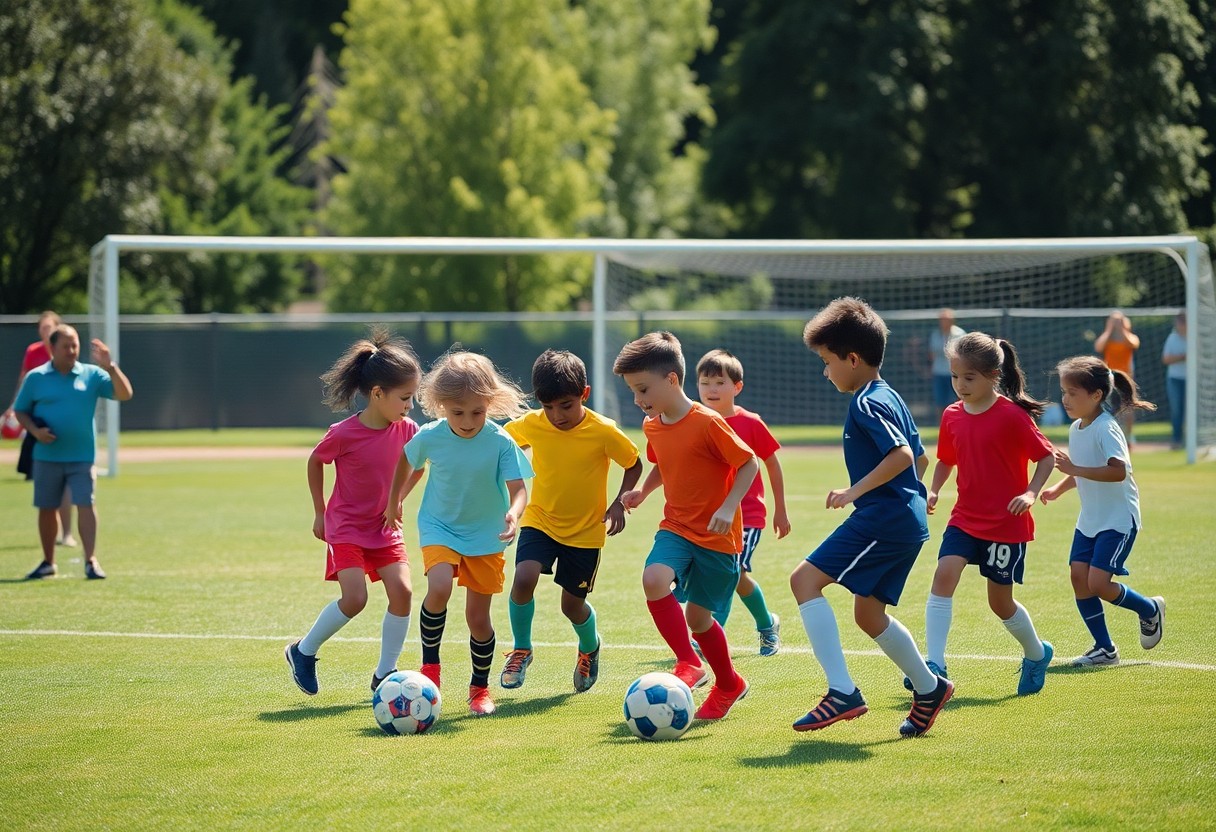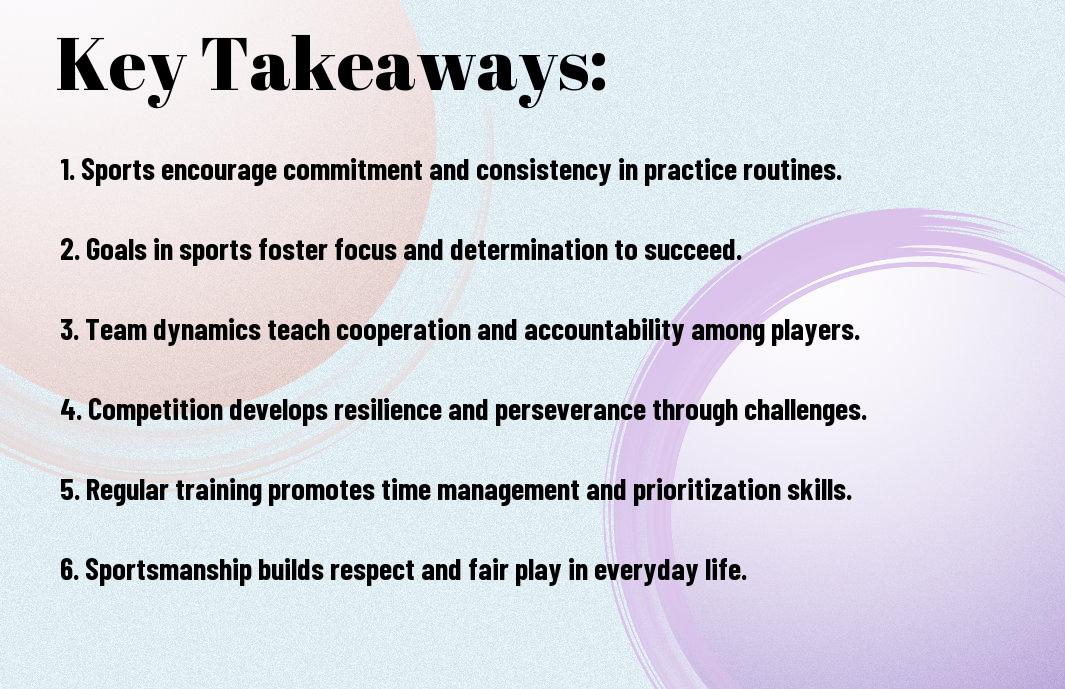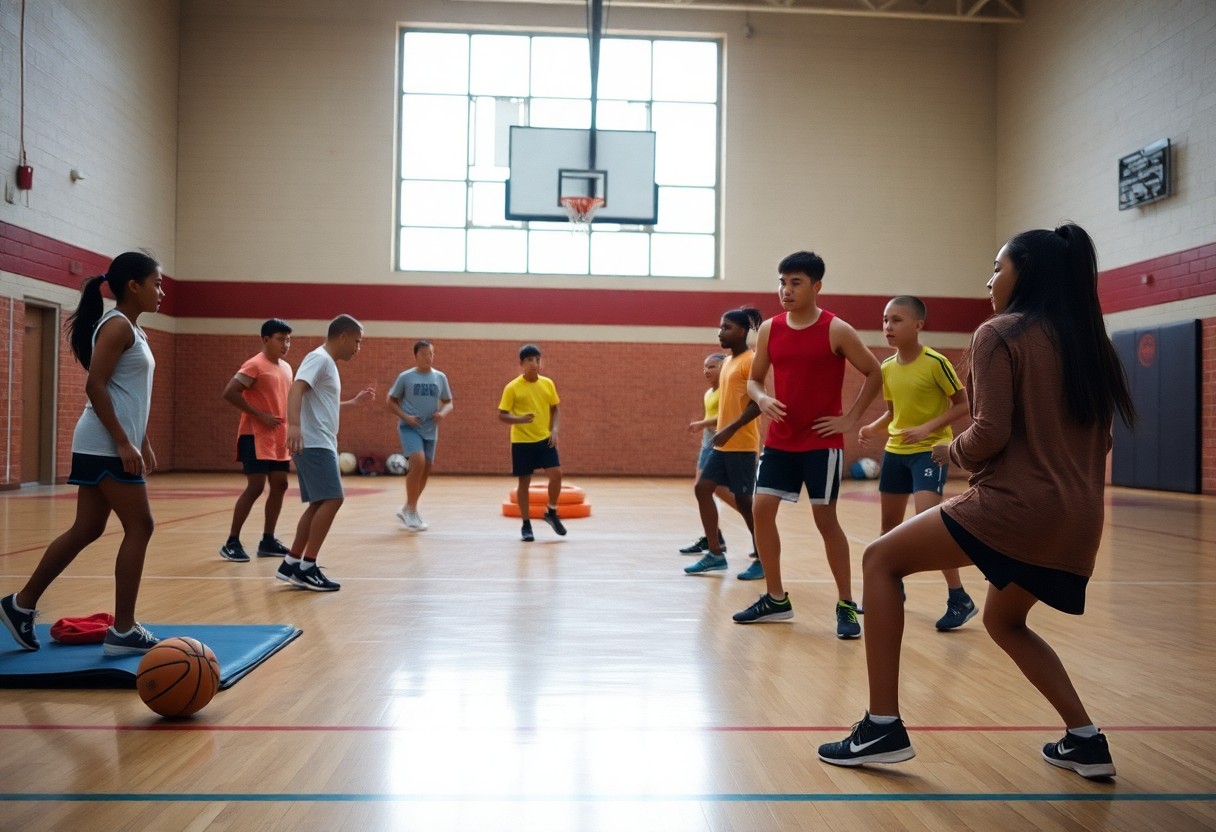Most parents understand that sports can be fun for their children, but you may not realize the profound impact that physical activity has on their overall development. Engaging in sports not only fosters physical fitness but also enhances social skills, boosts self-esteem, and cultivates teamwork. As your child participates in sports, they learn valuable life lessons that contribute to their emotional and cognitive growth. This blog post will explore how sports play a vital role in shaping well-rounded, confident individuals during their formative years.
Key Takeaways:
- Physical Health: Engaging in sports promotes physical fitness, helping children develop strong muscles and bones while reducing the risk of obesity.
- Social Skills: Participation in team sports fosters communication and cooperation, enabling children to build lasting relationships and work effectively with others.
- Discipline and Time Management: Sports require commitment and practice, teaching children important life skills such as discipline and the ability to manage time effectively.
- Emotional Resilience: Sports experiences, including wins and losses, help children develop emotional control and resilience in the face of challenges.
- Self-Esteem: Achievements in sports can significantly boost a child’s self-confidence, encouraging them to set and pursue personal goals.
Physical Development
As your child engages in sports, their overall physical development experiences significant enhancement. Participating in sports activities encourages kids to use their bodies in diverse ways, improving strength, flexibility, and coordination. These benefits not only support physical fitness but also aid in establishing lifelong healthy habits. When children develop these skills early on, they are more likely to pursue an active lifestyle as they grow, fostering wellbeing in their adult years.
Enhancing Motor Skills
Development of fine and gross motor skills is a major outcome of sports participation. Engaging in different sports allows your child to practice coordination, balance, and agility, all of which contribute to their ability to perform daily tasks and engage in other physical activities comfortably. As they refine these motor skills, you will notice a boost in their confidence and physical competence, which enhances their enjoyment of playing games and participating in sports.
Promoting Healthy Growth
By incorporating sports into your child’s routine, you contribute to their healthy growth trajectory. Regular physical activity helps in the development of strong muscles and bones, while also improving cardiovascular health. Sports provide a structured way for children to expend energy, which can play a part in maintaining a healthy weight vital for their overall wellbeing.
At the core of promoting healthy growth is the establishment of habits that nurture both physical and mental health. Sports not only encourage your child to stay active but also support the development of social skills, self-discipline, and teamwork. Engaging in sports helps maintain a balanced lifestyle, reducing the risk of obesity and related health issues. By fostering an environment where sports are a regular part of life, you set your child on a path towards lifelong physical wellbeing.

Social Skills
Clearly, participating in sports offers children invaluable opportunities to cultivate necessary social skills. Engaging in athletic activities allows you to interact with peers, fostering communication, empathy, and problem-solving abilities. This interaction contributes not only to individual growth but also enhances your child’s competence in social situations, making them more adept at navigating diverse group dynamics throughout life.
Teamwork and Cooperation
Above all, involvement in team sports teaches the importance of teamwork and cooperation. You learn to work with others toward a common goal, sharing successes and overcoming challenges as a unit. This collective effort nurtures vital communication skills and respect for others, which are applicable far beyond the playing field.
Building Friendships
Any child participating in sports will find ample opportunities for building friendships. The shared experiences of training, competing, and celebrating achievements enable deep connections to form, enriching your child’s social life and emotional well-being.
Cooperation on a sports team often leads to friendships that extend beyond the field. Your child learns to support teammates, sharing both triumphs and setbacks, which fosters bonding. These relationships teach them about trust, loyalty, and the joys of camaraderie. As they practice teamwork, they also build a network of friends who share their interests, paving the way for lasting connections both in and out of sports.

Emotional Development
Not only do sports provide physical benefits, but they also play a significant role in your emotional development as a child. Engaging in team activities and competition allows children to navigate their feelings, build resilience, and develop social skills that contribute to their overall emotional intelligence.
Managing Stress and Anxiety
Along with promoting physical fitness, participation in sports can serve as an outlet for managing stress and anxiety. Engaging in regular physical activity releases endorphins, which can uplift your mood and help you cope with the challenges you may face both in and outside of the sports arena.
Boosting Self-Esteem
Behind every athletic achievement lies a boost in self-esteem. When you master a skill, score a point, or win a game, it instills a sense of accomplishment that fosters positive self-worth in your developing identity. Sports offer opportunities for everyone to shine, regardless of individual talent, leading you to appreciate your unique strengths.
At the heart of boosting self-esteem through sports is the recognition of personal growth and achievement. When you participate in team sports, you are not only encouraged to set and achieve goals but also to celebrate both personal milestones and collective victories. This supportive environment empowers you to embrace challenges, leading to a healthier self-image that carries into other areas of your life.
Cognitive Benefits
Many studies highlight the significant cognitive benefits that children gain from participating in sports. Engaging in physical activities helps improve focus, enhances memory, and boosts problem-solving skills. As you encourage your child to be active in sports, you’re also fostering their ability to think critically and effectively, which can greatly aid their academic performance and personal development.
Strategic Thinking
An integral aspect of sports is the need for strategic thinking. When your child engages in team sports or games, they learn to develop and implement strategies, anticipate opponents’ moves, and make real-time decisions. This practice not only sharpens their analytical skills but also enhances their ability to think ahead and assess situations effectively.
Goal Setting and Achievement
Between practice sessions and competitions, the process of setting goals becomes an important lesson for your child. When they set personal or team goals in sports, they learn the value of planning, perseverance, and consistency. This experience translates to other areas of life, teaching them the benefits of hard work and discipline in achieving desired outcomes.
Strategic goal setting in sports allows your child to identify what they want to accomplish, whether mastering a skill or winning a match. As they work toward these objectives, they learn to break larger goals into smaller, manageable tasks, which builds patience and resilience. Achieving these goals fosters a sense of pride and confidence, emphasizing the importance of effort and dedication in all endeavors, inside and outside of sports.
Life Skills Acquired through Sports
Once again, engaging in sports offers you more than just physical benefits; it nurtures imperative life skills that will serve you throughout your life. From teamwork to communication, the lessons learned on the field or court translate into valuable abilities that become increasingly important as you grow older. By participating in sports, you develop skills that can enhance your academic performance, social interactions, and future professional endeavors.
Discipline and Time Management
At the heart of sports lies the importance of discipline and time management. When you commit to a training schedule, you learn to prioritize your tasks and manage your time effectively, balancing sports with academics and other responsibilities. This skill not only ensures you meet deadlines but also helps instill a strong work ethic that you can apply in various aspects of your life.
Leadership Qualities
Around every successful sports team, strong leaders emerge who guide and inspire their teammates. Through active participation, you naturally cultivate your leadership skills, learning how to motivate, communicate, and navigate challenges as a group. These experiences empower you to take initiative and lead others, preparing you for future roles in various environments.
Leadership is developed in sports as you’re often placed in scenarios that require decision-making and problem-solving amidst challenges. You learn to motivate your teammates and strategize on the fly, which hones your ability to communicate effectively and inspire confidence. When facing adversity, these experiences shape your resilience and teach you how to guide others through difficulties, making you a valuable asset in any team or organization. Such skills will serve you well, not only in sports but in countless aspects of life.
Risks and Challenges
Now, while sports can provide numerous benefits for your child’s development, there are also inherent risks and challenges that you should be aware of. You may encounter various obstacles, including potential injuries, the pressure to perform, and the need for balance between sports, academics, and social life. Understanding these risks allows you to better support your child in navigating the competitive world of sports while ensuring their overall well-being.
Injury Prevention
At the forefront of your concerns should be injury prevention, as physical activity can expose your child to various risks. It’s important for you to ensure that your child practices proper techniques and uses appropriate protective gear. Regular check-ups and fitness assessments can help identify any potential issues before they lead to injury, creating a safer environment for your child’s sporting endeavors.
Balancing Sports and Academics
Against the backdrop of sports participation, you may face the challenge of ensuring your child maintains academic success. Finding the right balance between sports commitments and school responsibilities is crucial to their overall growth. You have the ability to guide your child in setting priorities, managing their time effectively, and developing study habits that complement their athletic pursuits.
In addition, you can foster a supportive environment by encouraging open communication about their workload and scheduling. By working together, you can help your child create a balanced routine that allows for both athletic excellence and academic achievements. This balanced approach not only enhances time management skills but also prepares your child for future responsibilities beyond sports and education.
Conclusion
Considering all points, it’s evident that engaging in sports significantly enhances your child’s development across various dimensions. From fostering social skills to promoting physical health and boosting confidence, your involvement in their sports activities can shape a well-rounded individual. By prioritizing sports, you invest in their future, ensuring they cultivate valuable life skills. To research deeper into this topic, check out these Four reasons why sport is important in early childhood ….
Q: How do sports contribute to physical development in children?
A: Engaging in sports helps children develop their physical health by improving their strength, flexibility, and coordination. Regular physical activity through sports leads to better cardiovascular fitness, muscular endurance, and overall body composition. Additionally, being involved in sports can promote a healthier lifestyle by instilling habits of regular exercise from a young age, which can lead to long-term health benefits.
Q: In what ways do sports influence social skills in children?
A: Participating in sports provides children with opportunities to interact with peers, fostering the development of imperative social skills. Through teamwork and collaboration, children learn how to communicate effectively, share responsibilities, and support one another. These experiences can help them build relationships, enhance their ability to resolve conflicts, and develop a sense of belonging within a group, all of which are important for their social development.
Q: How can involvement in sports affect a child’s emotional growth?
A: Involvement in sports can greatly benefit a child’s emotional well-being. Through sports, children learn valuable lessons about resilience, discipline, and managing success or failure. This helps them build self-esteem, confidence, and a positive self-image. Additionally, the challenges faced in sports environments can encourage children to develop coping strategies and emotional regulation, contributing to their overall emotional intelligence and stability.

